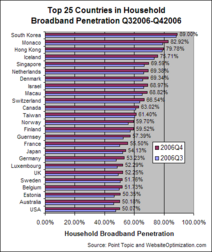…the authoritative go-to resource for comments by – and comparisons between – top U.S. policymakers regarding the pace and benefits of broadband deployments. The ongoing U.S. Presidential election campaign already features the policy positions of the candidates. Broadband services play a vital role in a host of areas in both the North American and world economies. These much-sought benefits go beyond consumer desires to include community economic development in rural and urban regions, plus critical applications in education, public safety, military preparedness and disaster response.It’s somewhat unfortunate that it’s phrased as Broadband, not Internet policy, but given the membership of WCA, that’s understandable. I can’t tell at first glance how thorough it is. They ask for comments.— WCA Thought-Leaders Forum: U.S. Presidential Candidates Debate Broadband, accessed 13 June 2007
-jsq

 Sometimes Bob Frankston makes me shake my head in wonder:
Sometimes Bob Frankston makes me shake my head in wonder:
 Susan Crawford hits the broadband nail on the head:
Susan Crawford hits the broadband nail on the head:



 Hands Off the Internet
notes that all major TV networks suddenly (since last year)
stream programs over the net, and concludes:
Hands Off the Internet
notes that all major TV networks suddenly (since last year)
stream programs over the net, and concludes:
